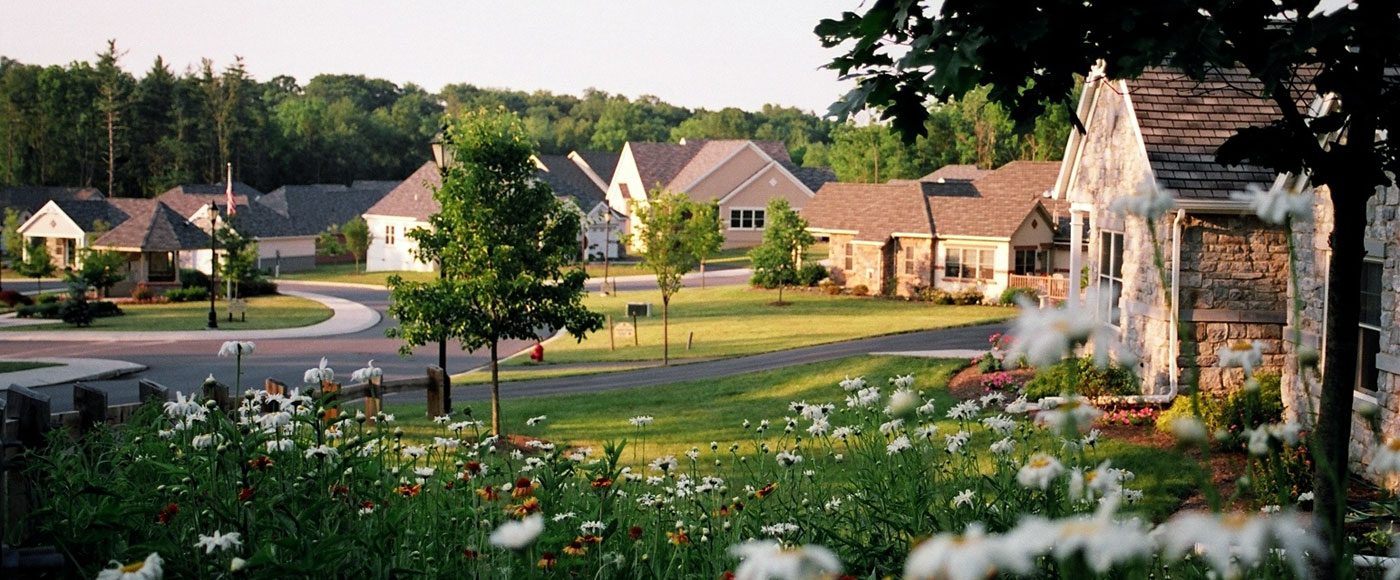It’s never too soon — or too late, for that matter — to plan for the future.
Getting older can be a combination of joy, surprises and challenges. With a little bit of planning, it can be one of the most fulfilling stages of life. As we age, we have many choices when it comes to where to live during our retirement years. There are many things to consider.
By learning about and taking advantage of all of the options that are available to you, you can enjoy peace of mind and quality of life. The best way to get the most out of your future is to plan for it.
Considering a Senior Living Community
One housing option in retirement living is a senior living community or a continuing care retirement community (CCRC). A continuing care retirement community offers a variety of living options- including apartments and homes for independent living, as well as on-site healthcare such as personal care, therapy services and skilled nursing care. These levels of care are available in one location. A CCRC can provide an alternative for many people to enjoy the second half of their lives.
Today, CCRCs are communities where residents lead fulfilling lives as they focus on their favorite interests and pursuits instead of worrying about home maintenance and what to do if a health crisis arises. People living in a continuing care retirement community are living longer, healthier lives than ever before.
A CCRC provides a variety of housing options, health care, activities and security allowing it to be a practical solution for those who are planning for their retirement future. Living in a CCRC allows you (and your loved ones) to have the peace of mind knowing that decisions are already made for most likely scenarios that could arise in the future.
How to Get Started
If you decide that a CCRC is the right choice for you, there are some steps you need to take to start the process. Do preliminary research on the internet for senior living communities in the area you want to live. Call and speak to a Marketing Representative in those communities. Ask them to send information about their community. In addition to asking all of the questions listed below, plan to visit all of the CCRC’s you are considering. A visit will give you a firsthand impression of what it will be like to live there.
Visiting the community will also give you the chance to see the entire community, talk with staff and residents, ask questions, see the different levels of care, and taste the food. You want to be comfortable with all aspects of the community.
Things To Consider
1. Housing Considerations
Consider the different options available and what housing lifestyle best suits your current and future housing needs. Do you plan to stay in your house as long as possible? Will you downsize to a smaller home, condominium or apartment? Should you consider a senior living or continuing care retirement community? Consider the multitude of available floor plans, including services that are available and expenses if you stay in your home.
2. Medical Considerations
Both the costs and the management of any future medical care should be considered. You will need a plan to coordinate any needed medical care through one doctor and he/she should be brought on board with that plan. Ideally this doctor would be in close proximity to where you live or wherever you plan to move in the future.
3. Family Considerations
If you do have children, what are your children’s expectations? Many families think they can provide care during the aging process but are not prepared for the financial, physical and emotional toll it can take.
4. Financial and Legal Considerations:
Expenses for possible long-term care also need to be discussed. Now is the time to plan a long-term strategy and investigate the details of insurance coverage. Everything from your will to power of attorney should be discussed; although these can be uncomfortable topics. Who will make health care decisions if you are not able to do so for yourself? What is your expectation for end-of-life care? It is important to understand and communicate your end-of-life wishes and secure the legal documentation so you can be sure those wishes will be carried out.
Questions To Ask Continuing Care Retirement Communities
- Who owns the community? Is it a not-for-profit community or for-profit? The philosophy and mission and the quality of care can be impacted by the type of organization it is. You want to know who manages the community and their reputation for quality. Is there a Board of Directors who oversees the management of the community? You may want to ask who sits on the board, how they are chosen and how long they serve. What is the community’s financial status? This is a long-term commitment and you want to be sure that you can get everything you are promised in the contract. It is important that the CCRC be on solid financial ground and adequately funded for the future. Always ask for a copy of the community’s financial disclosure statement.
- What are the policies and guidelines within the community? Ask for a copy of the Resident Agreement (which is the contract) and a copy of the Resident Handbook. Find out how the policies are enforced.
- What is the community’s reputation? Ask the residents and staff members about the community. Find out about inspection results for the skilled nursing center and personal care which are available online.
- What types of contracts are offered in the community? Ask about different options for level of care and costs. Find out what services are included in the monthly fees and what services are extra. A monthly fee covers costs such as utilities, maintenance, housekeeping, transportation, security, property insurance, services, programs and some amenities.
- How does the timing of services affect the costs? The benefit of a CCRC is that healthcare is available onsite, so you don’t have to leave the community if you need a higher level of care. Find out how the fees are affected when you move from one level of care to another. Are those fees based on the going rate at the time of the move or are the costs set when you sign the contract?
- What is the availability of medical services in the community? Get a complete understanding of what is included in the CCRC. If you need short-term medical care, where will that care be provided? Are all medical services within the CCRC campus or are there some services outside the campus? Where are personal care, nursing and rehabilitative services provided? You may not need nursing care right now, and may never need it, but this is the time to think of a worst-case scenario and find out how the CCRC would accommodate your needs.
- What is the CCRC’s financial status? This is a long-term commitment and you want to be sure that you receive everything you are promised, even if you don’t need it right away.
- What is the entrance fee used for? There are generally two types of CCRCs- “Fee for Service” and Life Care.” Both have advantages that you should explore and see which fits your needs best. Moving into a CCRC has an upfront investment. Find out how the money is used and how the amount of the initial fee — as well as any refund or health care credit — is calculated. Be sure to ask what portion of the entry fee might be held in escrow and how much of it would be refundable if you chose to leave the CCRC.
This process can seem overwhelming at first but it is important to understand all the facts about a CCRC before entering into a contract. Take your time with this research. Living in a CCRC eliminates some of the stress and fear of the unknown conditions that might be in your future and it gives you the freedom to enjoy your retirement.
If a continuing care retirement community sounds like a right fit for you, get in touch with the Marketing Team at Cornwall Manor today and discover why so many people have discovered the “new nature of senior living.” Call or email us to schedule your visit. You will discover why so many of our residents tell us that they should have made the move to Cornwall Manor sooner.








